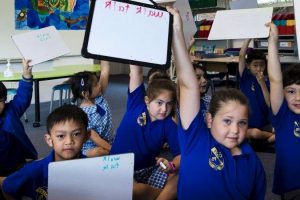Dud teachers? In Victoria, it’s the lack of phonics that’s the problem

It is ironic that the Acting Minister for Education, Stuart Robert, should blame “dud teachers” for the decline in student achievement, as he did last week.
In fact, you would struggle to find a topic that dominates the thoughts of primary school teachers more than how well their students are learning to read. Every teacher, whether they work in the public or private sector, knows this foundational skill is critical, not simply for reading itself, but so that students can access the broader curriculum, discover science and history, communicate a project idea, or read a maths problem.
NSW Year 1 students use their knowledge of phonics to spell on their whiteboards. Victorian primary school students are not necessarily taught reading using phonics.Credit:Rhett Wyman
It is well documented that students who fail to learn to read to a proficient standard are likely to have poorer life outcomes, including fewer employment opportunities, lower incomes, and are more likely to be dependent on welfare and involved with the justice system.
Teachers know this and they are doing all they can with the information and resources they are offered.
To the ongoing frustration of educators and researchers in the early literacy space, the debate about teaching reading continues long after the science has been settled: more children learn to read efficiently when taught via a structured approach based on phonemic awareness (the ability to distinguish distinct sounds in words) and phonics (the relationship between letters and sounds).
This has resulted in a fractured system whereby a Year 1 student in a NSW public school will receive high-quality, evidence-backed instruction, which explicitly teaches them how to decode new words using phonics skills.
However, a similarly aged student in Victoria, which remains wedded to the inferior “balanced literacy” approach based on learning whole words, is likely to be encouraged to guess unfamiliar words from context or pictures, with phonics often a secondary consideration.
I began investigating teachers’ perspectives on their experiences teaching early reading and the systemic constraints that influence teaching as part of my doctoral research.
According to the study, only 18 per cent of teachers reported they were personally included in decisions about programs or methods to teach reading, while only 7 per cent were permitted to choose programs and methods for their classes. Teachers also reported conflict, frustration and anger that they weren’t offered the skills they needed to teach a wide range of students to learn to read in their initial teacher education or within their school.
For example, the study showed that 50 per cent of participant teachers were not offered professional development related to phonics, despite more than 80 per cent relating their desire to learn about phonics-based approaches.
These barriers prevented many teachers from shifting their practice to align with the research evidence. As one teacher observed: “We still use Fountas and Pinnell [a literacy company established in 1996 based on the debunked “balanced literacy” approach to learning], but it is not considered best practice for all students. I am frustrated that we … aren’t setting all children up for success.”
How a society empowers its most vulnerable members entails more than just a vision of equity or a cycle of continual blame. Ministers of education should recognise they need to offer the conditions for achievement for all students, and not just for those who learn easily or those with the advantages of birth.
PISA results confirm that reading achievement in Australia has been declining since international testing began in 2000, with about one in five 15-year-olds not acquiring sufficient literacy to participate effectively in society.
Recently, in Canada, the Right to Read Project and Ontario Human Rights Commission released a report on the issues plaguing the teaching of reading and the inadequacy of prevailing “balanced literacy” practices. The report highlights that when children don’t learn to read adequately at school, their human right to participate in society is violated.
All teachers play a vital role in achieving this goal and transforming the lives of children. But without an agreed foundation of high-quality, scientifically validated professional knowledge of how children learn to read, schools will struggle to rise to this challenge.
The Australian national curriculum is in the process of being rewritten to elevate the explicit teaching of phonics and remove references to balanced literacy instruction – and the Victorian government should follow. But it needs to go further to ensure teachers have a foundation of high-quality professional knowledge that clearly explains how children learn to read – something that is not commonly available to them now.
As The Age’s education editor Adam Carey has reported, schools that have introduced phonics-based approaches are reaping the benefits, but there is more to be done to show teachers what is possible. I urge the Victorian government to ensure teachers not only focus on phonics, but that all teachers understand why.
This research is an urgent call to establish consistent, high-quality professional knowledge for the teaching of early reading as a pressing social justice issue that demands a collaborative and evidence-informed humanitarian response to ensure more students learn to read.
Dr Tina Daniel is a researcher at Deakin University and an affiliate of the Deakin University Centre for Humanitarian Leadership.
Most Viewed in National
From our partners
Source: Read Full Article

